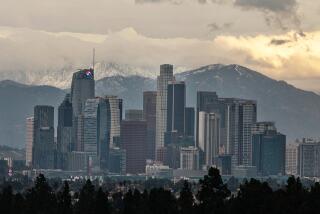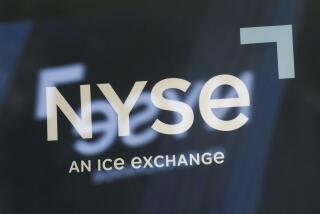Default Rate of Corporate Bonds Rockets 338% : Securities: The high rate for the first quarter reflects the deep depression in the junk bond market.
- Share via
Defaults on corporate bonds soared 338% during the first quarter, reflecting the deep woes of the junk bond market, the Bond Investors Assn. said Wednesday.
Thirteen corporate bond issuers defaulted on $5.7 billion in debt, compared to nine issuers defaulting on $1.3 billion in bonds during the like quarter a year ago, the trade group reported.
The figures were skewed by the bankruptcy of two Campeau Corp. units, the Federated and Allied department store companies, which stopped paying on debts worth $3.5 billion during the first quarter. Even excluding Campeau, however, defaults rose 64% during the period, said Richard Lehman, president of the Bond Investors Assn.
“The excesses and abuses of the junk bond market, which began in late 1985, are with us still in the form of poorly structured businesses trying to support impossible debt loads,” Lehman said. “It is pretty hard to service 12% or 15% debt with a flat economy and no inflation, and that’s what a lot of these companies are facing.”
Lehman is pessimistic about the future of the junk bond market, despite the fact that many industry experts believe that the worst is over.
In the past, the junk market’s worst problem was that it was illiquid, with very few issues trading actively. That illiquidity contributed to steep price declines when a handful of big buyers became sellers late last year. On average, junk bonds sell for about 80 cents on the dollar, although some healthy issues sell for more than face value and others sell for only a few cents on the dollar.
Lehman contends that market prices for high-yield bonds do not reflect the effect of widespread bond defaults. He predicts that more than $40 billion in bonds will default over the next three years, which would further hurt market prices.
Other market experts disagree, saying the market has sunk about as low as it can get.
“In my view, the default rate has been more than factored in,” said Marko Budgyk, president of Houlihan, Lokey, Howard & Zukin Investment Management. “Barring a major economic downturn, we think the default rate will be a lot less than the implied rate in the market.”
More to Read
Inside the business of entertainment
The Wide Shot brings you news, analysis and insights on everything from streaming wars to production — and what it all means for the future.
You may occasionally receive promotional content from the Los Angeles Times.










